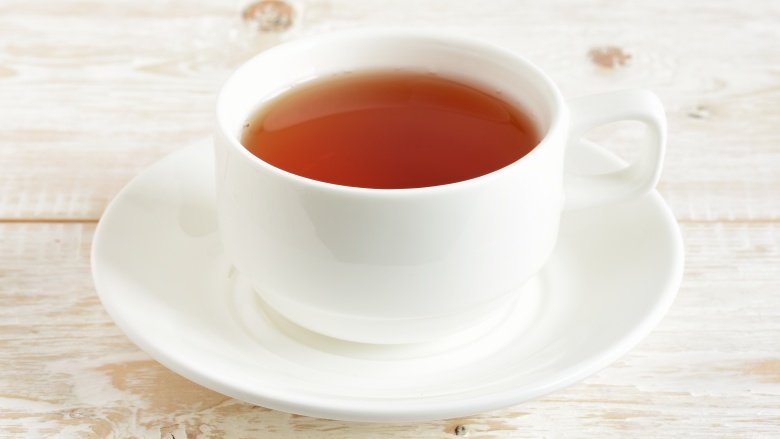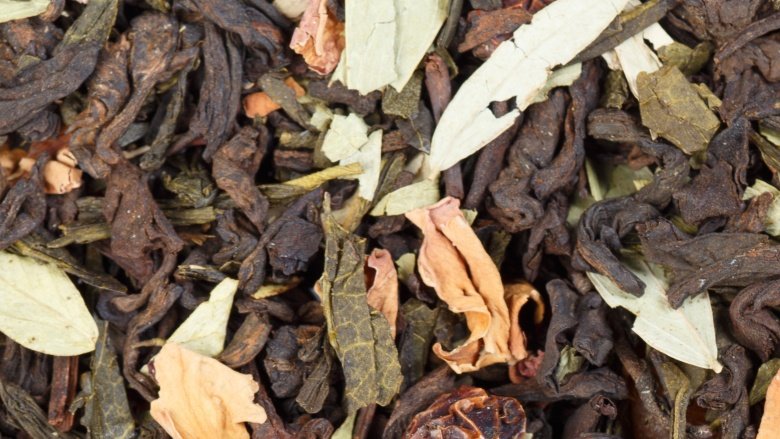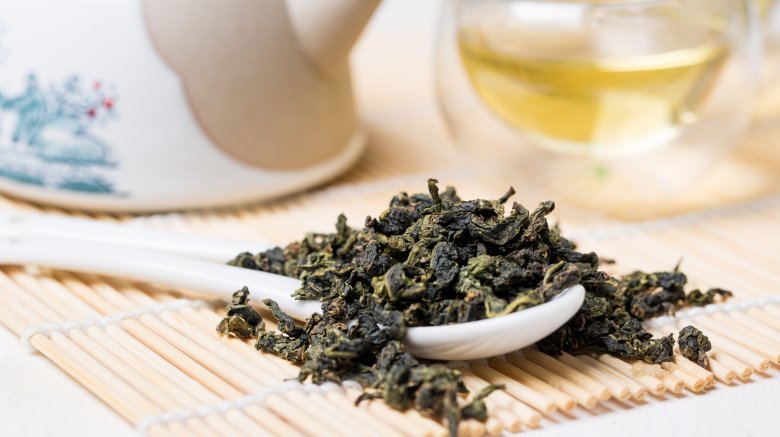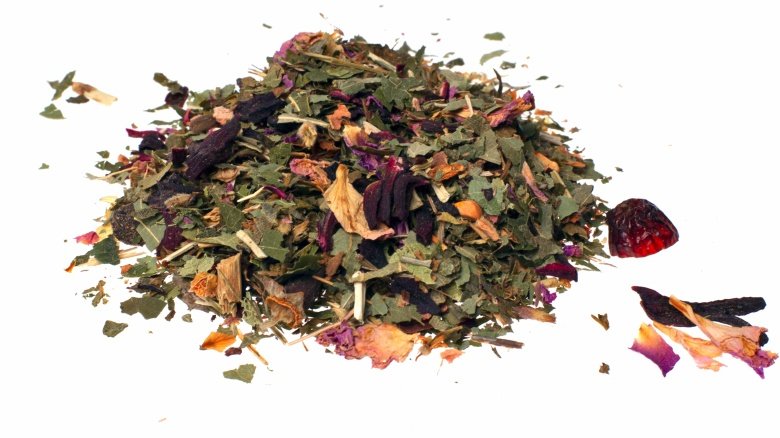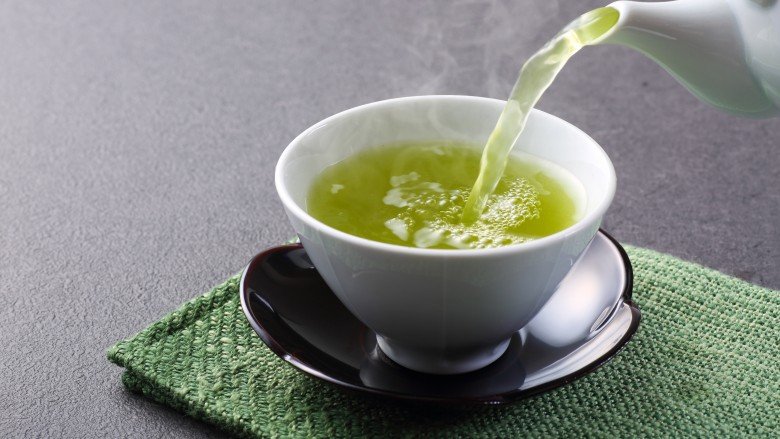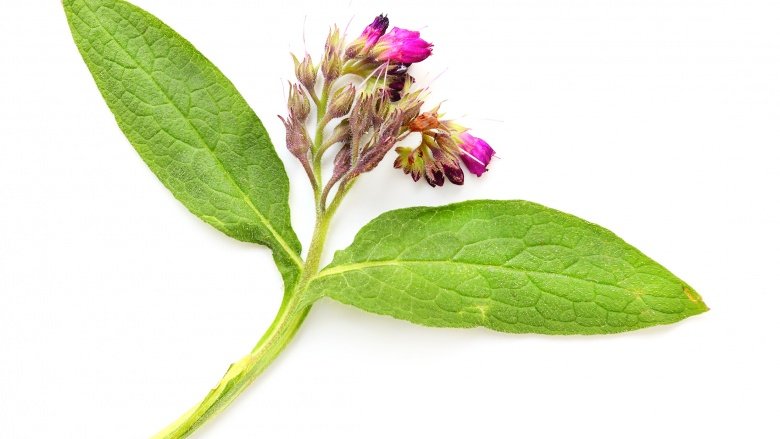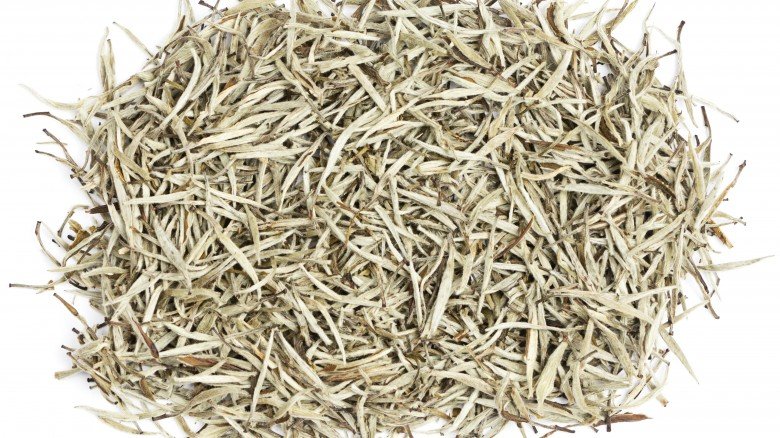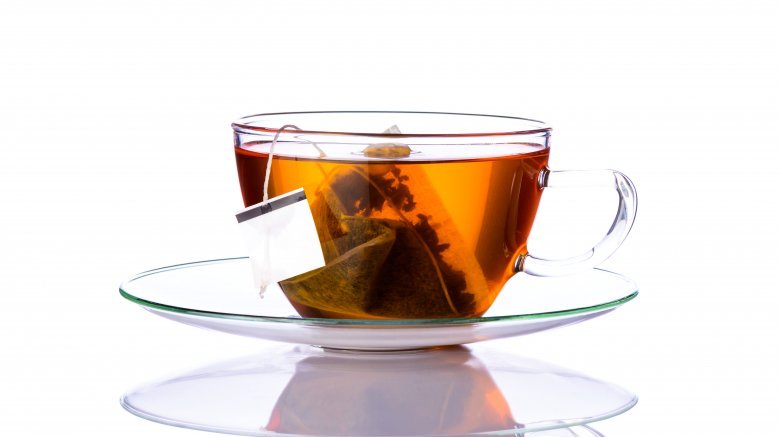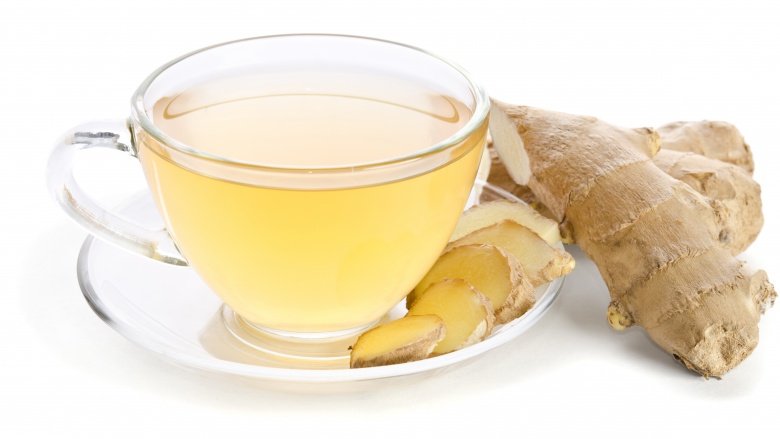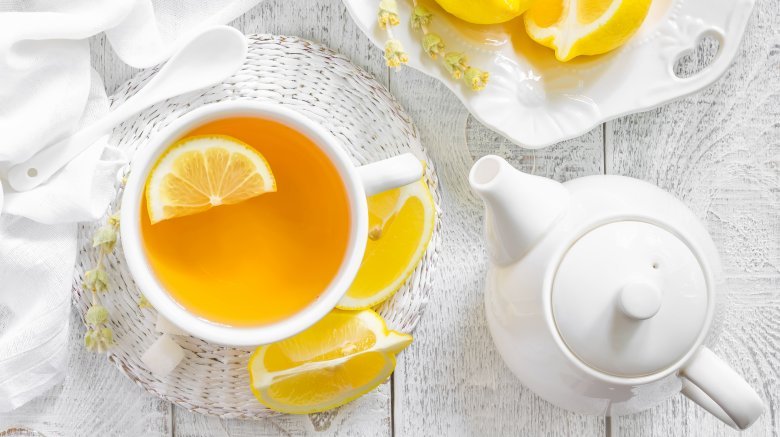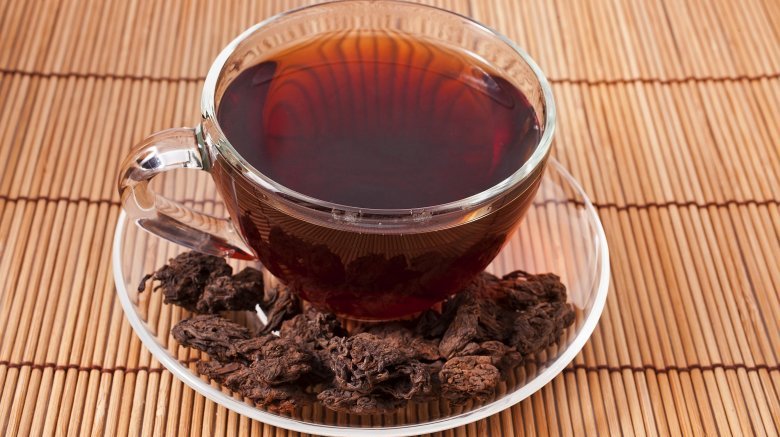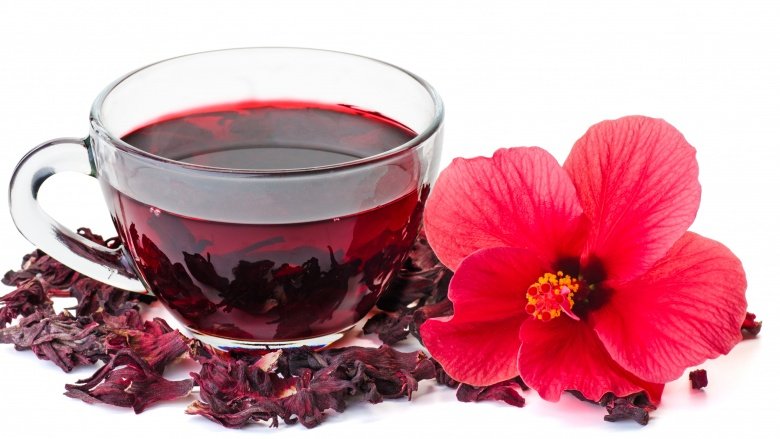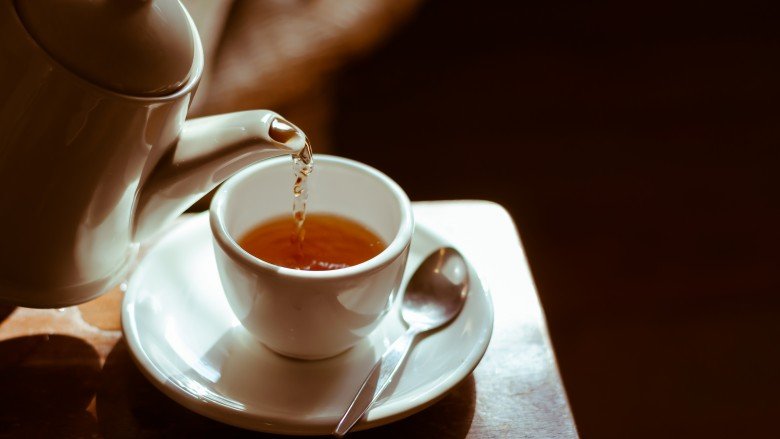Teas You Should Be Drinking And Teas You Shouldn't
Once upon a time, tea was considered something special. So special, in fact, that entire blocks of the day were set aside for partaking in the warm, comforting beverage — always prepared with care and only using the finest of ingredients. Times, however, have changed. These days, pretty much any beverage made by throwing some herbs into water gets described as "tea." You can buy it at any coffee shop, corner store or gas station... but just because you can buy it doesn't necessarily mean that you should.
If you believe everything you're told, you might be convinced that tea is a magic elixir, offering health and vitality to all who partake. And while with good tea, that reputation is almost entirely deserved, it definitely doesn't apply to some pretenders to the throne. To clear up the confusion, here are some teas you should be drinking, and a few you shouldn't.
Drink black tea
You should be drinking black tea. Not only is it delicious in its many varieties, it offers many health advantages, from weight loss to battling diseases like cancer, diabetes, and many more. However, like many things in this world, the devil is in the dosage. The issue with black tea is in its (tiny) fluoride content, which ordinarily wouldn't be enough to cause you harm, even if you drink a dozen cups a day.
However, if you drink as much tea as one 47-year-old woman did, you might end up in trouble. She drank a gallon of tea a day for almost two decades, brewing it with between 100 and 150 tea bags each time. It is estimated that she was consuming in excess of 20 milligrams of fluoride per day (way, way above the recommended dose), and after 17 years of this, her bones were like glass. She ended up in the hospital suffering severe pain from brittle bones, and had to have all her teeth removed. Other than that, though, she was probably super-duper healthy.
Don't drink detox teas
You shouldn't be drinking detox teas. Apart from the whole "detox" industry being basically one big scam, there is an ingredient in most detox teas that you should only really be taking in certain circumstances. Senna leaf is known to irritate the lining of the bowels, which has a laxative effect. This is fine if you're constipated, or a surgeon wants to operate on your digestive system and doesn't feel like working around last night's dinner. However, if you consume it regularly in teas, it will not be fine.
In the short term, these teas will mostly just "detox" your bowel, which, admittedly, will probably leave you feeling a bit less bloated. Unfortunately, it will also dehydrate you and "detox" out a bunch of important stuff, like electrolytes and healthy nutrients, which do more good inside you, especially if you intend to have a nice, long, pain-free life.
Drink oolong tea
Falling somewhere in between black tea, which is made with fully oxidized tea leaves, and green or white tea, which are both made with non-oxidized tea leaves, we have oolong tea. Oolong tea is made by partially oxidizing tea leaves in the sun, then twisting the strands of tea leaves to develop oolong's distinctive flavor. Oolong teas from different regions of the world can vary widely in percent of oxidation, meaning some oolong teas will have much more caffeine than others.
Unique not only in flavor, oolong tea also enjoys many of the health benefits of both black and green tea. Oolong tea is said to help with blood sugar control, heart health, brain function, and metabolism, as well as protect against some forms of cancer. Oolong tea is rich in minerals like manganese, and contains a host of tea polyphenols, which act as antioxidants. Oolong is also hailed for containing the amino acid theanine, which acts as a stress-reducer in the body.
Don't drink most herbal teas
Aside from ginger, hibiscus, and peppermint—which have clinically recognized health benefits for the consumer—steer clear of basically any herbal teas. Any positive effects perceived after drinking any other herbal infusion may be, at best, a placebo effect (or possibly leftover good feelings from the chocolate biscuit). Until more studies have been done, the only information about most herbal teas comes from largely non-scientific or traditional medical sources.
While there certainly could be merit in ancient tea-based remedies, without studies to back them up, you might as well fall back on a traditional New York prescription for your problems. We refer, of course, to the Long Island iced tea — because you definitely won't be feeling much pain after a couple of those.
Drink green tea
Green tea has a ton of fans. So many, in fact, that Authority Nutrition declared it the "healthiest beverage on the planet" — a pretty bold statement, likely due to green tea's high concentrations of epigallocatechin gallate (EGCG) which is loaded with a host of medicinal properties. Green tea is credited with boosting brain function, enhancing weight loss, and staving off cardiovascular disease and cancer.
What else does green tea fight? Death, apparently. A study of elderly Japanese found that those who regularly imbibed the hot green libation were 76 percent less likely to die during the 6-year study. Enjoy green tea by the bag, prepared with loose leaves, or as matcha — a premium green tea made into a powder and believed to contain the highest health benefits of all green tea.
Don't drink comfrey tea
For those of us who are prone to injury, a cup of tea made from comfrey might sound like a good idea. After all, comfrey is said to promote the healing of wounds, bruises, and even broken bones. It's also claimed to help with digestive issues, though it isn't a friend to every part of your body. Comfrey contains pyrrolizidine alkaloids which, when metabolized and consumed in sufficient quantities, can cause severe damage to the liver. The risk varies depending upon when the plant was harvested and which part of the comfrey plant is used, but because of the risk, its sale is banned in the US and many other countries for anything other than topical applications (and even then, there's a danger of buildup).
Bags of dried leaves are still available online, however, and although they should only be used to create creams and ointments, it is totally possible to throw them in some hot water and make a lovely cup of steaming liver failure.
Drink white tea
Like most tea we drink, white tea also comes from the Camellia sinensis leaf. It has a pleasantly mild taste with a natural sweetness, which makes it preferable for some people who can't get past the bitterness of green tea. The difference in white tea lies in how the leaf is treated, or rather, not treated.
White tea comes from the youngest buds of the plant that are covered in fine silver hairs giving the buds a white, fuzzy appearance. The buds are plucked and steamed to prevent oxidation, resulting in a tea that is high in body-friendly catechins that are believed to help fight cancer, diabetes, bacterial infections, and even aging. So you can feel pretty darn good about downing a few cups per day. If it's really doing work on the aging front, make sure you grab your ID before you hit the bar.
Don't drink tea that has steeped too long
If you're a regular tea drinker, you've no doubt prepared and consumed your cup of tea the way many people do — by pouring hot water over a tea bag into a cup, and allowing the tea bag to steep there the entire time you enjoy your tea. Perhaps you even think this method allows the water to extract even more of all of that tea goodness from the tea bag. Unfortunately, this is the opposite of what you should do when preparing tea.
Dr. Gerry Schwarfenberg of the University of Alberta says we should actually keep the brew time of teas to under three minutes, especially if the tea is from a region known for high levels of lead and aluminum, like China. Not only will a shorter brew time lessen the leaching of heavy metals into your cup, it will also decrease the amount of fluoride you possibly consume while enjoying your brew. Schwarfenberg also recommends drinking your tea from a glass mug, instead of china, which could also contain lead in its glaze.
Drink ginger tea
Ginger has long been used in traditional medicine to treat nausea and other digestive issues, which makes it an excellent choice for use in teas. It is especially useful for pregnant women experiencing morning sickness, since it's safe to use during pregnancy and will help with menstrual pain.
People who exercise might also find benefit from a cup of ginger tea, since studies have shown it can reduce exercise-related muscle pain, as well as inflammation. It also happens to taste pretty good, which is more than can be said for some "teas," real or otherwise.
Don't drink lemon flavored tea
No, you don't have to avoid squeezing some fresh lemon in your tea, but you should be wary of those tea bags that are labeled as "lemon flavored." The tea leaves used in these preparations are usually of low quality, and has "higher amounts of noxious metal than tea infusions made from whole leaves," according to Magdalena Jeszka-Skowron, PhD, of the Poznan University of Technology in Poland.
Powdered and liquid iced tea products are also suspect, with studies indicating heightened fluoride and acid content. Jeszka-Skowron recommends adding fresh lemon to better-quality, whole leaf teas. Even then, she advises that you should wait until you have removed your tea bag or leaves from your brew before adding the lemon, which could alter the pH and extract heavy metals from the tea leaves.
Drink pu-erh tea
True pu-erh tea hails from the Yunnan province of China, and has a very devoted legion of drinkers. To make pu-erh tea, the tea leaves are only partially oxidized, then left with microbes which, over time, ferment the tea. Pu-erh may be aged for a just a few years for "young raw" pu-erh, or fermented for many decades to produce the prized "aged raw" pu-erh teas, which can fetch thousands of dollars and more in the marketplace.
Pu-erh is highly touted as a weight loss remedy in Asia, and there is some science to back up the claims. While most studies are on animals, a study of 36, pre-obese adults in Japan showed that pu-erh tea contributed to a significant loss of visceral fat and reduction of waist circumference in the test subjects. Pu-erh is also useful in the treatment of high cholesterol, due to the naturally occurring chemical it contains, lovastatin, which is the same chemical found in cholesterol medications.
Don't drink kava kava
This ceremonial tea from the South Pacific is one that has a ton of potential for misuse. A known anti-anxiety remedy, kava kava has sedative qualities that can produce a drunken stupor in users who overindulge. It has been outright banned in countries like Australia and Poland, and its use has been linked to cases of liver disease, though the quality of the kava kava used in those cases is likely the culprit.
While still legal in the U.S., you should be fairly warned: it can produce some pretty unpleasant side effects when mixed with alcohol or prescription meds. If that wasn't enough, get this — overuse of kava kava can cause a scaly skin rash that only goes away once you stop partaking. Doesn't sound too relaxing to me!
Drink hibiscus tea
In many countries, drinking tea is a ritual (sometimes involving tasty biscuits) that generally leaves you feeling fairly relaxed after. However, if your stress issues are more serious, a diversion from the traditional high-tea brew might have a greater benefit for your health. Consider hibiscus tea, for example. While it isn't made from the leaves of the camellia sinensis plant, a recent study showed that regular consumption of hibiscus tea was linked to a noticeable drop in blood pressure, in a group of patients suffering from elevated stress and pressure.
The study didn't consider the effect of consuming tasty snacks with the tea, but since a chocolate biscuit never made anyone feel worse, it was probably just inferred.
Don't drink cheap tea
Regardless of your preferred choice of tea, quality matters. Though one of the healthiest drinks to grab, certain teas come with their fair share of health risks. The Journal of Toxicology found in 2013 that over 70 percent of the 30 teas tested contained potentially unsafe levels of lead, while 20 percent contained unsafe levels of aluminum. A separate study also found that 36 of 44 teas tested had unacceptable levels of pyrrolizidine alkaloids (a toxin that grows on plants and is linked to liver damage, that is easily spread from a mother to a fetus or breastfeeding child).
Another study found elevated fluoride content in some teas. While fluoride is good for your teeth in low doses, like those in water fluoridation programs. But the amount found in these teas was highly concentrated and could actually be detrimental to teeth, bones, and joints. Experts recommend avoiding teas that are grown in China, Sri Lanka, and India, which are known to have more contaminated soil.
